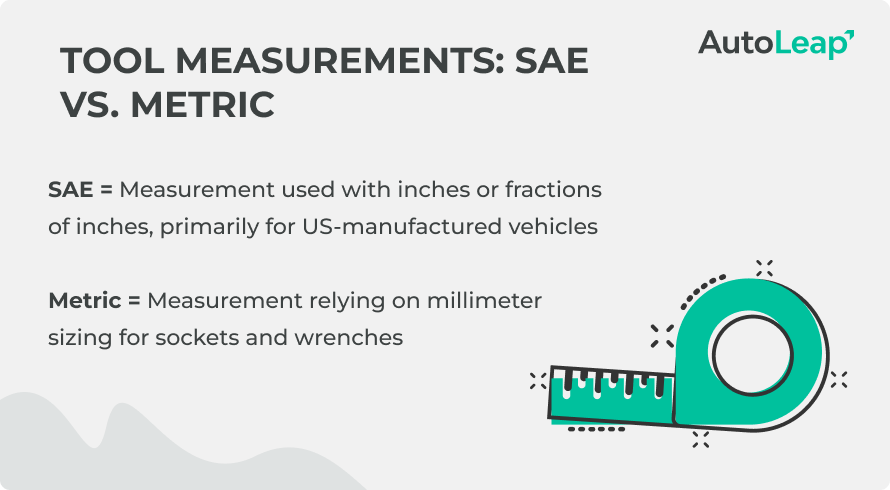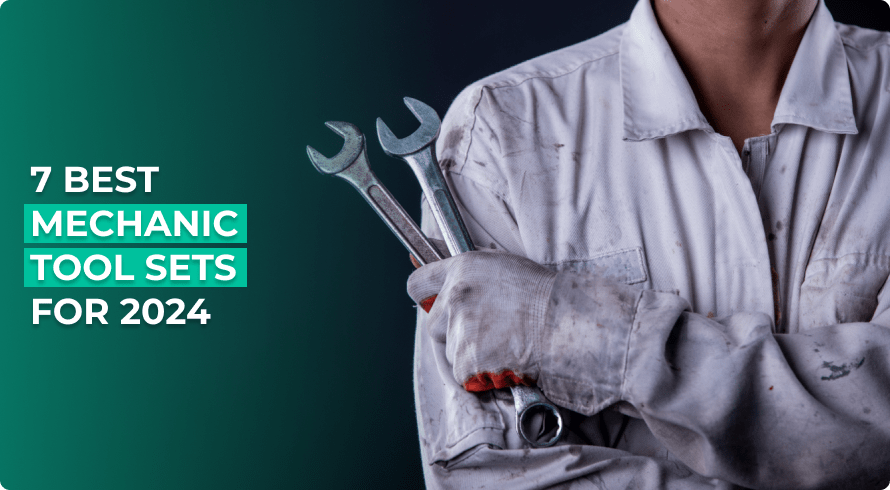A mechanic is only as good as his tool set. Having the best mechanic tool set on hand is crucial for your daily shop repairs.
Are you looking for the best mechanic tool set? You came to the right place! There are many popular sets to consider. Let’s walk through some of the top options.
Unlock powerful tools to manage your shop. Get the full AutoLeap experience today.
But first: a few definitions
Before we begin, we would like to highlight a few definitions of terms and pieces. If you are a first time buyer, this information will help you narrow down options and choose the best mechanic tool set.
SAE vs metric: What's the difference?

These terms refer to the measurements and sizing of wrenches.
SAE is an abbreviation for ‘Society of Automotive Engineers’. The SAE form of measurement is used with inches or fractions of inches. It primarily applies to cars manufactured in the USA.
Additionally, the metric system relies on sizing through millimeters. If you rely on this system, then your sockets and wrenches need to match accordingly.
You will notice both terms used frequently in our list to designate the types of tools.
The best mechanic tool sets

-
DEWALT Mechanic Tool Set
Priced at around $170, the 247-piece DEWALT Mechanic Tool Set is great for auto shop mechanics. It also comes in 205, 172, and 84-piece sets that are less expensive. You can get the one most suited to your auto shop’s specific needs.
This set includes
- ratchets and sockets
- a bit driver with specialty and nut bits
- combination wrenches
- hex keys
It even comes with a durable case featuring metal latches of the tool sets. This helps your mechanics organize the tools easily and store them for travel too.
What we like about it
This tool set is best for professionals needing a durable, all-encompassing set for daily use. It’s particularly useful for heavy-duty automotive repairs, thanks to its sturdy ratchets and wide range of sockets. Overall, a great starter set.
With this level of quality and value, DEWALT is worth investing in for your auto shop.
-
228-piece DEKOPRO Mixed Tool Kit
This popular 228-piece DEKOPRO tool set features all the essential tools you need in a sturdy mold case, along with an organizer that keeps your tools in place.
When we say all you need, we mean it! This comprehensive set for basic tools is great for handymen, repairmen, construction workers and the like. It also comes at an affordable price, just over $70.
The tools are made of high-quality steel and feature anti-corrosion protection.
What we like about it
This versatile set is perfect for both beginners and seasoned mechanics. The compact case makes it easy to transport and store, so it’s a great choice for mobile mechanics or those with limited space.
Depending on your repair shop’s requirements, you can consider adding this basic tool set.
-
450-piece Craftsman Mechanic Tool Set
If you are a professional, the more tools the better. This 450-piece Craftsman tool set is one of the best professional mechanic tool sets on the market.
The molding case is made out of plastic and is designed to open up with four-tiered drawers that stock all the tools. This effect makes it super portable!
At just over $300, it’s not exactly cheap but great to cover your basic maintenance & repair needs.
What we like about it
Ideal for DIY enthusiasts and beginners. It excels in general maintenance tasks and small repairs around the shop, offering a well-organized and easy-to-use selection of tools.
However, 450-piece is a lot of tools, so you can even opt for the 102-piece CRAFTSMAN Mechanic tool kit as it’s much cheaper. It’s also got an amazing assortment of tools so you should be good to cover a wide range of tasks.
-
210-piece Stanley Mechanic Tools Kit
The fancy-looking Stanley Mechanics tool set has a chrome finish, providing complete corrosion resistance. Also featuring a blow molded case, it opens up and closes like a briefcase!
The tools in this kit feature high-strength steel and a good grip design. This set is primarily a mechanic socket collection with multi-use functionality, making it one of the best mechanic socket sets for your simple repairs.
What we like about it
Priced at around $100, the Stanley Mechanic tools kit is a good set for the money. It has everything you need for a car repair, so it is certainly a great addition to your auto shop. The ratchet extenders in particular are an excellent tool and helped reduce the work time.
-
239-piece GEARWRENCH Mechanic Tool Set
The widely popular Gearwrench mechanic tool set comes with three pull-out drawers, full polish chrome SAE and metric standard sockets!
This one has the 45-tooth full polish chrome quick-release ratchets and knurled extension bars. This gives your mechanic a good grip when working on the job. The full polish chrome means cleaning it up is easy. The off-corner loading technology in the sockets and wrenches reduces fastener rounding. All these tools come in a 3-drawer storage box with independent sliding drawers. You can lock the drawers with the side flaps.
What we like about it
This comprehensive tool kit is a mechanic’s dream, offering a wide array of tools perfect for tackling a variety of automotive tasks. The set stands out for its high-quality ratchets and sockets, making it ideal for both routine maintenance and more complex repairs. The well-organized case keeps everything in place, making it easy to find the right tool when you need it most.
This set is also great to work on German cars. So, if your shop gets a lot of luxury cars, then this tool set is best to repair those. The quality is also on the same level as Craftman.
-
613-piece GEARWRENCH Mechanic tool set
A bit (or maybe a lot) on the pricier side, this 613-piece Gearwrench mechanic tool set has literally everything you will need.
The tools are of top-notch quality and even have engravings of their sizes. It includes a 90-tooth gear that has a 4° swing, making it easier to turn quickly in tight spaces.
What we like about it
Perfect for intricate tasks that require precision, this set’s slim-profile ratchets and high-quality sockets are great for working in tight spaces, such as engine compartments.
Professional mechanics will love this set. So you must consider assigning it to your auto shop.
-
229-piece Stanley Mechanic Tool Set
With chrome black finishes, this 229-piece Stanley mechanics tool set is great for your simple repairs and is one of the best mechanic tool sets for the money considering its high quality and affordability. These tools have both SAE and metric measurements, making for quick changes if you need to adjust.
The set features corrosion resistance and comes with a lifetime warranty. It also includes laser etchings on each socket.
What we like about it
This budget-friendly set is best for occasional users or as a backup set. It’s highly portable and handy for roadside repairs or quick fixes on the go.
-
TEKTON Socket and Ratchet Set
The TEKTON Socket and Ratchet set has multiple sizes. It has 83, 73, 55, and even 46-piece sets for mechanics. The price varies with the size you choose. However, the 73-piece set is priced at around $170. This socket and ratchet set has multiple-sized sockets. These can work great with hex-shaped fasteners.
The polished chrome finish is easy to clean and highly resistant to corrosion.
What we like about it
Excellent for extensive jobs requiring a diverse array of tools. The set’s versatility makes it a go-to choice for both car repairs and home projects.
Factors to consider when choosing the tool set
When selecting the best mechanic tool set for your auto shop, several factors come into play to ensure you’re making a wise investment that meets your specific needs.
1. Tool variety and set size
Look for a set that includes a wide range of tools, such as ratchets, sockets, wrenches, and specialty bits. Having diverse tools ensures you’re prepared for various repair tasks.
Also, consider the size of the toolset based on the number of pieces and the variety of tools included. For instance, the DEWALT Mechanic Tool Set offers options ranging from 84 to 247 pieces, allowing you to tailor your selection according to your shop’s requirements.
2. Tool quality
Opt for tools made from high-quality materials like chrome vanadium steel for durability and long-term performance. Quality tools are less likely to break or wear out quickly.
Customer reviews consistently highlight the durability and performance of sets like the 239-piece GEARWRENCH Mechanic Tool Set, known for its compatibility with German cars and professional-grade quality.
3. Portability
Evaluate the portability of the toolset. Especially if your mechanics need to travel for repairs. A well-designed case with secure latches keeps your tools organized and protected during transport. Sets like the 228-piece DEKOPRO Mixed Tool Kit offer a balance between portability and functionality, making them suitable for on-the-go use.
4. Case design
The design of the tool set’s case is crucial for organization and storage. Look for sets like the DEWALT Mechanic Tool Set, which features a durable case with metal latches, ensuring easy organization and secure storage, even during travel. The case needs to tightly grip the various tools in there.
5. Price and value
While price is a significant factor, consider the overall value offered by the toolset. Sets like the TEKTON Socket and Ratchet Set provide professional quality at a reasonable price, making them a cost-effective choice for your shop.
You can set a budget range and find a toolset that offers the best value within your budget. Remember, investing in quality tools upfront can save you money in the long run by reducing replacements and repairs.
6. Customer reviews
Pay attention to customer reviews to gauge the real-world performance and reliability of the tool sets. Positive feedback, such as the appreciation for the variety of sockets and durability can guide your decision-making process.
These reviews will help you understand real-world experiences with the toolset. Look for patterns in feedback regarding quality, performance, and durability.
7. Specialized needs
If your auto shop specializes in certain types of vehicles, such as German cars, opt for tool sets like the 613-piece GEARWRENCH Mechanic tool set. These are designed specifically for professional mechanics and are compatible with German car repairs.
8. Brand reputation
Consider reputable brands like DEWALT, Craftsman, GEARWRENCH, and Stanley known for producing reliable and high-quality mechanic tool sets. Customer reviews and ratings can also help gauge a brand’s reputation.
Essentials to have in your toolbox
To ensure your mechanics are well-equipped for any task, here are some essential tools that should be included in your mechanic tool set:
1. Ratchets and sockets
– Ratchet Set: Includes ratchets of different sizes for efficient tightening and loosening of nuts and bolts.
– Socket Set: Provides a range of socket sizes to fit different bolt heads, from standard to deep sockets for accessing recessed bolts.
2. Wrenches
– Combination Wrench Set: Includes wrenches of various sizes. This allows you to handle different nuts and bolts with ease.
– Adjustable Wrench: Useful for tasks where a specific size wrench is not available. As it can be adjusted to fit different bolt sizes.
3. Pliers
– Needle-nose Pliers: Ideal for gripping and maneuvering small objects or reaching into tight spaces.
– Slip-Joint Pliers: Versatile for gripping and turning objects of various sizes with adjustable jaw positions.
4. Screwdrivers
– Phillips and Flathead Screwdrivers: Essential for driving and removing screws of different types and sizes.
– Precision Screwdrivers: Handy for delicate tasks requiring small and precise screw handling.
5. Hex keys
These are also known as Allen keys. These are important for tightening and loosening hexagonal bolts and screws. These are commonly found in automotive applications.
6. Specialty bits
Include specialty bits such as star (Torx) and Phillips bits for working with different types of screws and fasteners.
7. Portable lighting
A portable LED work light or flashlight is handy. It helps in illuminating tight spaces and enhancing visibility during repairs.
8. Safety gear
Include essential safety gear such as gloves, safety glasses, and ear protection. This is to protect your mechanics as they work with tools and machinery.
Frequently asked questions
What brand tools do mechanics use the most?
The brand tools that mechanics use the most are Snap-on and Matco Tools.
What is considered a mechanic's most valuable tool?
A mechanic’s most valuable tool is their diagnostic equipment, such as a professional-grade scan tool.
What is the best socket set for a mechanic?
The best socket set for a mechanic depends on their specific needs. But popular options include the Craftsman 450-Piece Mechanic’s Tool Set and the DEWALT Mechanics Tools Kit.
What is the hardest mechanic job?
The hardest mechanic job can vary. But tasks like engine rebuilds, transmission repairs, and electrical diagnostics are considered challenging.








